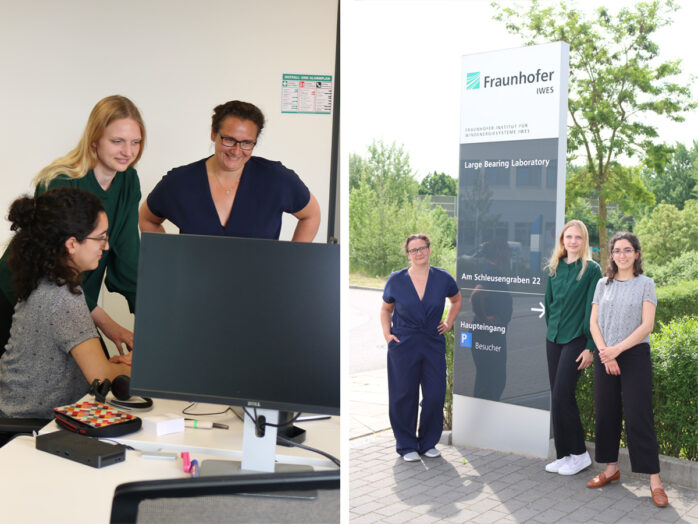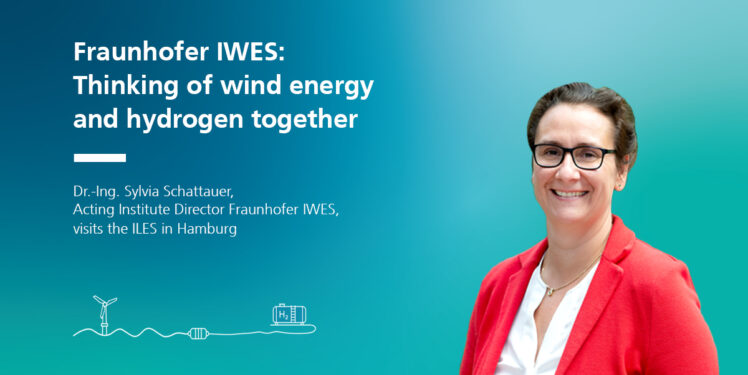Acting institute director Dr. Sylvia Schattauer research talks with research associate Aline Luxa at the Fraunhofer IWES Application Center for Integration of Local energy Systems (ILES/AWZ) site in Hamburg.
The subject of energy is currently very topical. The IWES is rising to the scientific challenges and has added hydrogen to its competence base.
Aline: “The Application Center for Integration of Local Energy Systems or AWZ ILES was founded in 2020 in cooperation with the Hamburg University of Applied Sciences (HAW). The scientific leadership is held by Prof. Gerwald Lichtenberg from the HAW and the administrative leadership by our CTO at IWES, Prof. Jan Wenske. I have been working as a research associate at the ILES since its founding and am responsible for modeling hydrogen systems.”
Sylvia: “The development of the hydrogen economy in Germany and Europe is influenced by research. What are the current topics for you at the ILES?”
Aline: “At the ILES, we develop model-based solutions for a sustainable energy transition. For example, in the Living Lab Northern Germany (LLNG) project, we are working on the modeling and optimization of microgrids. To do so, we need to model energy generators and storage systems. This also includes wind turbines and hydrogen systems such as electrolyzers. With our holistic approach, we look at systems including many components from other IWES departments. The cooperation with our Hydrogen Labs in Bremerhaven, Leuna, Görlitz are very important for this, so as to be able to implement our findings practically. This also happens in the LLNG, where 5 hydrogen hubs are being developed for the demonstration of hydrogen systems in Northern Germany.”
Sylvia: “Being able to use a good database is a challenge for science in all areas. How do you approach it?”
Aline: “That is true. We do so by working in close cooperation with the other groups at the IWES too. In addition, the ILES will also use data from the LLNG hubs, which we aim to utilize to validate our models. However, we also require data from our partners in industry and want to employ our expertise to acquire even more industry partners who will make their data available for research.”

Sylvia: “What are the greatest challenges for large-scale and widespread implementation of the production of green hydrogen in industry?”
Aline: “In industry, many things are naturally first implemented with an economic benefit. That’s why we are also considering techno-economic models in a position to incorporate political regulation. We aim to use our results to help get green hydrogen ready for the market. Furthermore, we also hope to create incentives for companies to adopt green technologies.”
Sylvia: “What does your scientific work on electrolyzers look like specifically?”
Aline: “We want to consider electrolysis as a complete system. In addition to the stack, that also includes the ancillary units such as compressors, pumps, gas processing, etc. That means that the dynamics of the ancillary units must also be taken into account. This is also important for the digital mapping of our labs. Furthermore, the grid connection poses challenges that cannot yet be fully foreseen. For this reason, we are also working in close cooperation with our IWES groups on systems engineering and power electronics. Specifically, we will develop control methods for the grid-supporting operation of electrolyzers in the LLNG project as the ILES. We assume that system services of hydrogen systems will be of great relevance for the support of the electrical grid. Furthermore, sustainable technologies are important to us, which is why we want to investigate how the dynamic operation of electrolyzers in conjunction with renewable energy generators affects aging or degradation. To this end, we are already developing new models together with our Analytics group at the IWES.”
Further information can be found here:
Summer School 2021 (fraunhofer.de)
Application Center for Integration of Local Energy Systems ILES (fraunhofer.de)
Hydrogen Lab (fraunhofer.de)

